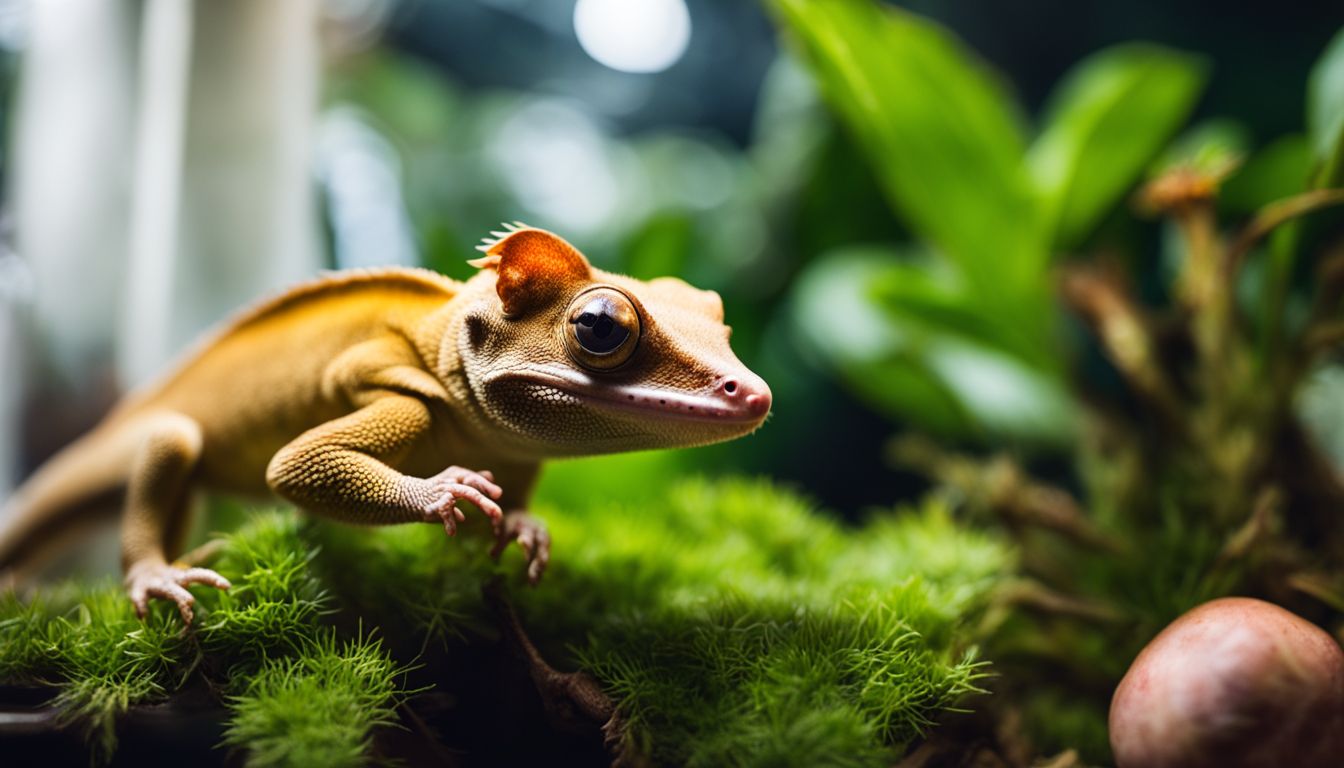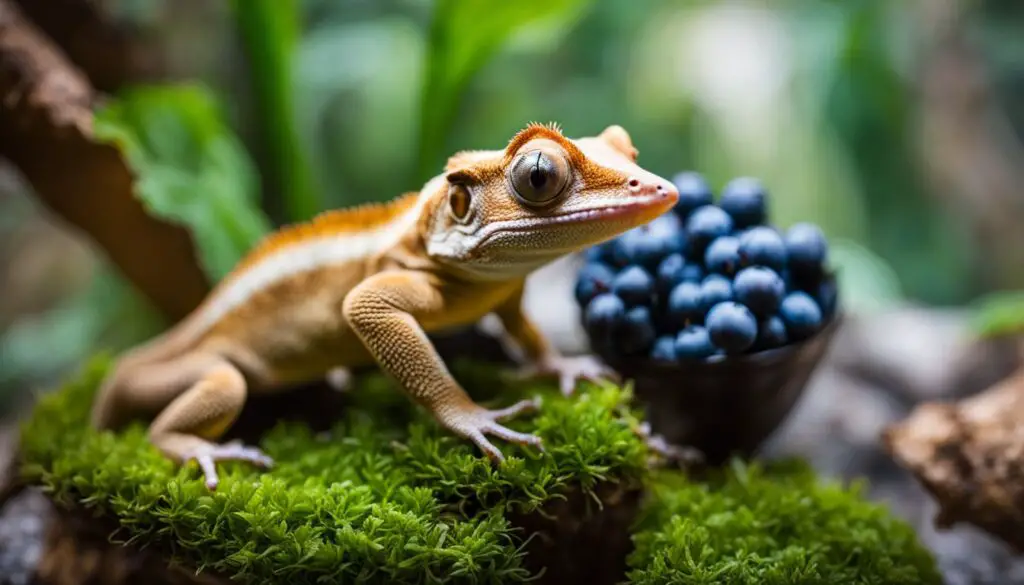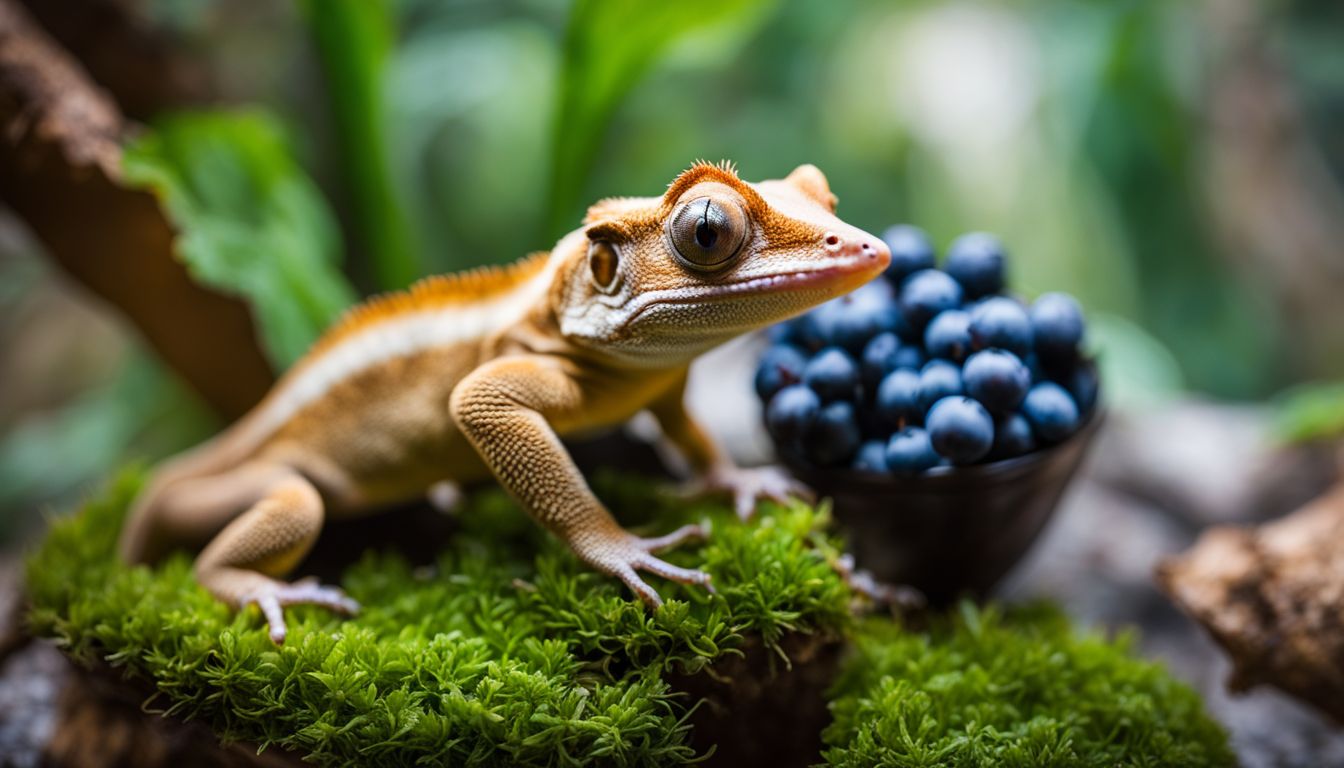As pet owners, we often treat our furry friends to a variety of snacks, but when it comes to the scaly companions in our lives, things can get a bit more complicated. If you’ve adopted a crested gecko into your family, you may be wondering what treats are safe and healthy for them.
Blueberries are known as nature’s candy and pack a punch of sweetness – could these little berries also be on the menu for your crested gecko?.
The good news is that crested geckos can indeed enjoy blueberries occasionally as part of their diet. These fruits carry antioxidants and vitamin C which can contribute positively to your pet’s health; however, moderation is key due to their sugar content and potential effect on calcium levels.
This article will guide you through how to safely include blueberries in your crested gecko’s feeding routine without causing dietary imbalances.
We’ll uncover the secrets of giving just the right amount of this juicy treat to keep your crestie both happy and healthy. Dive into our tips for keeping meal times exciting with new flavors while still looking out for their well-being—let’s make snack time fun again!
Key Takeaways
- Crested geckos can enjoy blueberries occasionally as they provide antioxidants and vitamin C, but moderation is crucial due to their high sugar content.
- It’s essential to monitor portion sizes and frequency of feeding to avoid health issues like obesity and diabetes in crested geckos.
- Alternative safe fruits for crested geckos include strawberries, blackberries, grapes, apples, pears, melons, and cherries. These fruits offer a variety of nutrients without disrupting calcium levels.
- Choosing organic blueberries over conventionally grown ones reduces the risk of exposing crested geckos to harmful pesticides and chemicals.
Examining the Safety of Blueberries for Crested Geckos

When it comes to feeding blueberries to crested geckos, it’s important to consider their nutritional value, calcium-to-phosphorous ratio, and oxalic acid content. Understanding these factors will help ensure that blueberries can be safely incorporated into your pet’s diet.
Nutritional Value and Health Benefits
Blueberries are full of good stuff for crested geckos. They have antioxidants that help the gecko’s body fight off harm. These small berries also give vitamin C, which keeps the skin and other parts healthy.
Crested geckos enjoy a sweet treat now and then, and blueberries can be just that when given in small bits.
But you must not give too many because they can make your gecko fat or even lead to sugar problems like diabetes. It’s best to mash them into a paste before offering them to your pet.
This makes it easier for crested geckos to eat since they don’t have teeth suited for biting into hard food. Remember, these berries should be a special snack, not an everyday thing.
The Importance of Calcium-to-Phosphorous Ratio
Crested geckos need the right balance of calcium and phosphorus in their diet. This balance is key for strong bones and good health. Foods with a lot of phosphorus can make it hard for their bodies to use calcium well.
That’s why the ratio, or relationship, between calcium and phosphorus (Ca:P) is so important.
Mangos and bananas have more phosphorus than calcium which isn’t great for crested geckos. Blueberries also have this issue, but not as bad as mangos and bananas. You should mix blueberries with other foods that have lots of calcium to keep your gecko healthy.
Now let’s look at oxalic acid content in blueberries and what it means for your pet’s health.
Oxalic Acid Content in Blueberries
Moving from the calcium-to-phosphorus ratio, it’s also key to note what else is in blueberries that could affect your crested gecko. Blueberries have something called oxalic acid. This acid can make it hard for their bodies to use calcium properly.
Since crested geckos need calcium for strong bones and overall health, too much oxalic acid is not good.
Blueberries are okay for your pet, but only sometimes because of this acid. Just give them a little at a time as a treat, so they get the good stuff like vitamins without too much oxalic acid.
It’s all about balance to keep your crested gecko happy and healthy!
Incorporating Blueberries into a Crested Gecko’s Diet

When feeding blueberries to your crested gecko, it’s important to offer appropriate portion sizes and consider the frequency of feeding. Also, preparing the fruit in a way that makes it easy for your pet to consume is essential for their overall health and well-being.
Appropriate Portion Sizes for Crested Geckos
Crested geckos should have small portions of blueberries, served as an occasional treat. A quarter or half a blueberry for adult geckos is suitable, while baby geckos can have even smaller amounts, such as one-eighth of a blueberry.
It’s important to monitor their reactions and bowel movements after feeding them blueberries to ensure they’re tolerating the fruit well and not experiencing any digestive issues or unusual behavior.
When incorporating fruits into the crested gecko’s diet, it’s crucial to be mindful of portion sizes and frequency to maintain their overall health and wellbeing. Next, we’ll explore how to safely introduce blueberries into your crested gecko’s diet.
Frequency of Feeding Blueberries
After determining the appropriate portion sizes for crested geckos, it’s important to consider the frequency of feeding blueberries. Blueberries should be given as an occasional treat due to their sugar content.
Including them in your pet’s diet once or twice a month can offer antioxidants and vitamin C. However, overfeeding can lead to obesity and diabetes. It would be best if you varied their diet by offering other safe fruits such as strawberries, blackberries, grapes, apples, pears, melons, and cherries to ensure balanced nutrition.
Offering blueberries occasionally ensures your crested gecko enjoys the benefits of these fruits without any negative health impacts related to excessive sugar intake. Remember that a small piece of select non-citrus fruit as a treat is fine now and then because they eat fruits in the wild.
Preparation Tips for Serving Blueberries
When preparing blueberries for your crested gecko, ensure they are thoroughly washed and free from any pesticides or chemicals. To serve them, mash the blueberries into a paste or small pieces to make it easier for your pet to eat.
Remember that while blueberries can be a tasty treat for your crested gecko, it’s important not to overfeed them as it could lead to health issues due to their high sugar content.
Now let’s explore how crested geckos react to blueberries and learn about alternative fruits that are safe for them.
Exploring Crested Geckos’ Varied Reactions to Blueberries
Despite their sweet taste, not all crested geckos may enjoy blueberries, but there are alternative fruits that are safe for them to eat. To find out more about the varied reactions of crested geckos to blueberries, keep reading!
Do All Crested Geckos Like Blueberries?
Crested geckos have different tastes, and not all of them like blueberries. Some may enjoy the occasional blueberry treat, while others might show little interest. It’s essential to observe your pet’s reaction when offering blueberries and provide a variety of safe fruits as alternatives, such as strawberries, blackberries, or pears.
Remember that in the wild, crested geckos also eat nectar and soft seeds, so it’s okay if they don’t take to blueberries right away.
Alternative Fruits Safe for Crested Geckos
While not all crested geckos may be fond of blueberries, there are several alternative fruits that are safe and beneficial for these reptiles. Fruits like strawberries, blackberries, grapes, apples, pears, melons, and cherries offer a variety of nutrients without disrupting their calcium levels.
However, it’s important to remember that moderation is key when offering fruit treats to your pet crested gecko as overfeeding can lead to health issues like obesity and diabetes. Additionally, mangos and bananas should be given sparingly due to their less favorable calcium-to-phosphorus ratio.
These safe fruit options provide essential vitamins and antioxidants while ensuring a balanced diet for your crested gecko’s wellbeing. It’s vital to keep in mind the importance of portion control and frequency when incorporating these fruits into your pet’s diet.
Purchasing and Storing Blueberries for Your Pet
When selecting blueberries for your crested gecko, look for organic options and store them in a cool, dry place to maintain their freshness. To learn more about the safe fruits for crested geckos, their feeding schedule and dietary needs, keep reading our comprehensive feeding guide!
Best Practices for Selecting and Storing Blueberries
When selecting blueberries for your crested gecko, opt for fresh, plump berries without mold or bruises. Choose organic blueberries to minimize exposure to pesticides. Store the blueberries in the refrigerator in a well-ventilated container with a lid to maintain freshness and prevent molding.
Before serving, rinse the berries thoroughly to remove any potential pesticide residue. Remember that blueberries can be given as an occasional treat and should not replace essential components of your crested gecko’s diet such as insects and balanced commercial food.
Organic vs. Conventionally Grown Blueberries
When it comes to choosing blueberries for your crested gecko, opting for organic ones is a better choice. Organic blueberries are grown without synthetic pesticides or fertilizers, which can be harmful if ingested by your pet.
Conventionally grown blueberries may contain residues of these chemicals, posing a risk to the health of your crested gecko. By selecting organic blueberries, you reduce the potential exposure to harmful substances, ensuring a safer and healthier treat for your pet.
Now that we have explored the best type of blueberries for your crested gecko’s diet, let’s delve into how to incorporate this fruit into their meals.
Conclusion
In conclusion, feeding blueberries to crested geckos can offer health benefits but should be given in moderation. Other safe fruits include strawberries, blackberries, grapes, apples, pears, melons, and cherries.
The practical tips provided aim to ensure a balanced diet for these reptiles. Have you considered incorporating some of these fruit options into your pet’s diet? Emphasize the impact of these dietary choices on your crested gecko’s health and well-being.
)
Crested geckos can indeed eat blueberries, but it’s essential to do so in moderation. Blueberries provide antioxidants and vitamin C, contributing to a balanced diet for your pet. However, overfeeding could lead to health issues such as obesity and diabetes.
It’s important to remember that while blueberries are safe for crested geckos as an occasional treat, they should not be the main part of their diet. Instead, consider incorporating other fruits like strawberries, blackberries, grapes, apples, pears, melons, and cherries into their feeding routine.
Always pay attention to the calcium-to-phosphorus ratio in the fruits you offer your crested gecko to maintain their overall health.
Interested in more reptile dietary insights? Discover if leopard geckos can eat darkling beetles on our dedicated page!
FAQs
1. Can crested geckos eat blueberries?
Yes, crested geckos can eat blueberries as an occasional treat due to their high sugar content, but they should not be a staple part of their diet.
2. What is the main diet for crested geckos?
The main diet for crested geckos consists of commercially available powdered diets or prepared meal replacement powders mixed with water.
3. Are there any other fruits that crested geckos can eat?
Yes, in addition to blueberries, crested geckos can also consume small amounts of mashed banana and pureed mango as occasional treats.
4. Should I remove uneaten blueberries from the terrarium?
It’s essential to monitor if the blueberries are being consumed and remove any uneaten portions within 24 hours to prevent mold or bacteria growth inside the terrarium.
5. How often can I offer blueberries to my crested gecko?
Blueberries should only be offered as a rare treat – approximately once a month and in very small amounts – due to their high sugar content.




